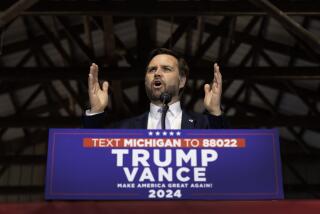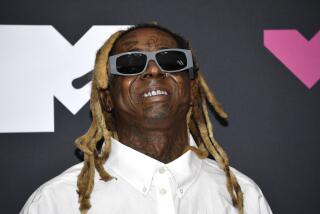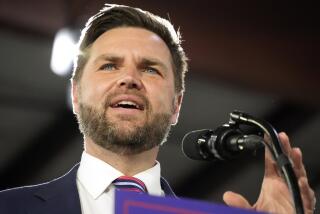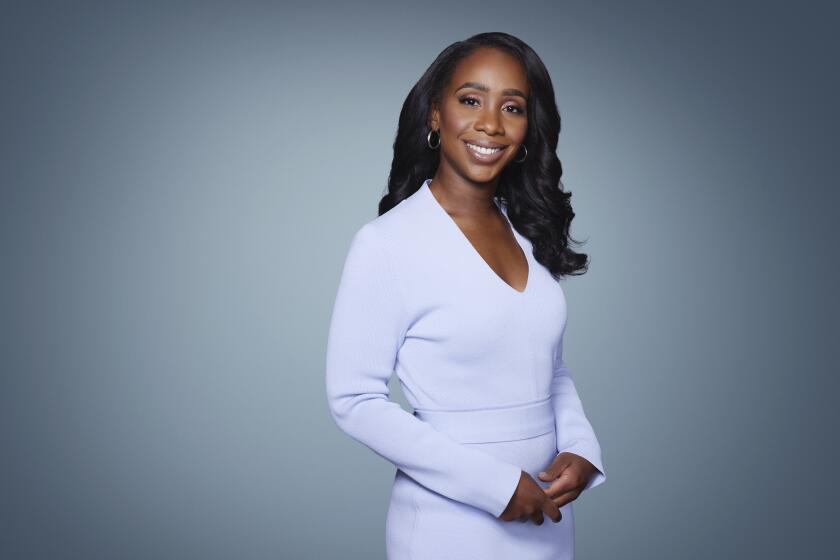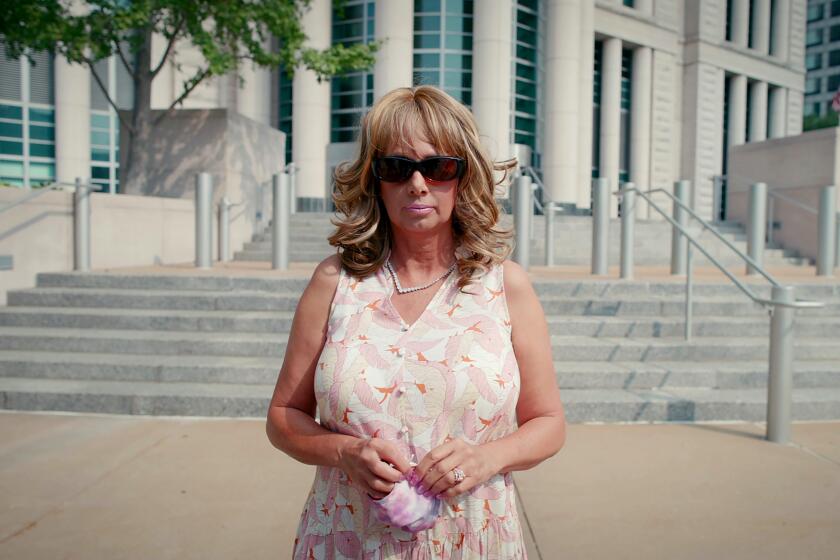‘I believe in white supremacy’: John Wayne’s notorious 1971 Playboy interview goes viral on Twitter
John Wayne is never going to be confused for a progressive by anyone familiar with his life and career.
The actor was famous as one of Hollywood’s staunchest conservatives: a onetime member of the reactionary anti-Communist John Birch Society, a producer for and actor in a film about the ignominious House Un-American Activities Committee and a vocal supporter of the Vietnam War after much of the public had turned against it.
But this week, snippets of an old interview he did with Playboy magazine, in which he expressed racist and homophobic sentiments and railed against socialism, began circulating on Twitter. A tweet with portions of the interview sent Sunday night from a screenwriter in Tennessee went viral — and, with that, Wayne’s politics were news again.
In the 1971 interview, Wayne railed against “perverted films,” giving the interviewer, Richard Warren Lewis, two examples when asked: “Easy Rider” and “Midnight Cowboy.”
The actor described the characters in the latter film with a homophobic slur, then went on to extol the virtues of sexual intercourse between men and women.
“I believe in white supremacy,” he said, and spoke harshly about African Americans, saying, “We can’t all of a sudden get down on our knees and turn everything over to the leadership of the blacks.
“I don’t believe in giving authority and positions of leadership and judgment to irresponsible people,” he said.
Of slavery, he said that he didn’t feel any guilt.
“I don’t feel guilty about the fact that five or 10 generations ago these people were slaves,” he said. “Now, I’m not condoning slavery. It’s just a fact of life, like the kid who gets infantile paralysis and has to wear braces so he can’t play football with the rest of us.”
And he spoke harshly about Native Americans when asked whether he felt any empathy for them, given the centrality many of them played in the Westerns he had worked on.
“I don’t feel we did wrong in taking this great country away from them, if that’s what you’re asking,” Wayne said. “Our so-called stealing of this country from them was just a matter of survival. There were great numbers of people who needed new land, and the Indians were selfishly trying to keep it for themselves.”
In discussion about Wayne’s interview online, reactions were split — not just along political lines but with many expressing surprise that Wayne’s views were being given attention nearly 40 years after his death.
Some wondered whether a 48-year-old interview with an actor who had been dead for almost four decades was fair game for discussion.
It is not the first time in recent memory that the remarks have resurfaced. They also circulated in 2016 after the actor’s daughter, Aissa Wayne, endorsed Donald Trump’s presidential campaign.
John Wayne’s life has long been noted for its contradictions. In a 1996 review of a Wayne biography, the Washington Post noted the deferments that allowed Wayne to escape serving in World War II.
“Other actors did risk all, and some lost, returning to the public’s indifference. Some of them were supplanted by Wayne himself, who took his deferments until service became a moot point, a fact he was ashamed of for the rest of his life,” the report noted.
Two of his biographers, Randy Roberts and James S. Olson, suggested “that Wayne’s subsequent anti-communist fervor, which became the most notorious aspect of his persona, was his way of compensating,” the review noted at the time.
“Yes, he did what others did or tried to, but those others weren’t necessarily so quick in later years to urge other men to risk their lives in war,” the Post’s review said.
Matt Williams, the Twitter user whose post about Wayne went viral, said he stumbled upon the interview while doing research for a Western script he plans to write. The feature had been linked in the comments section of a review he was reading on “The Searchers,” which features one of Wayne’s iconic roles.
“I certainly wouldn’t have expected him to be a progressive person when it comes to race, but I didn’t really expect to read something that bad,” Williams told the Post. “I’m not surprised at all to have found out the way that he felt. I’m just surprised that he was so open about it.”
Williams, who is based outside Nashville, said he’s been flooded with angry messages on Twitter since he posted the piece but understands why it struck a nerve.
“I think a lot of people recognize that those are views that are still pretty common today, even if people aren’t as blatant about it,” he said. “And he’s kind of held up as this ultimate American hero.”
But though the actor has been widely celebrated — he has an airport named after him in Orange County, complete with a nine-foot statue — his political legacy has also received a closer look in recent years.
In 2016, a Republican assemblyman from Orange County tried to declare May 26 John Wayne Day in the state, but the measure failed by a wide margin. Luis Alejo, a Democratic assemblyman from Watsonville, had read Wayne’s “white supremacy” quote from the Playboy interview.
As the Washington Post reported at the time, another lawmaker, Assembly member Lorena Gonzalez (D-San Diego), said her mother wouldn’t let her watch Wayne films because of the violence they depicted against Native Americans. She too read a quote from the Playboy interview.
Eli Rosenberg reports for the Washington Post.
More to Read
The biggest entertainment stories
Get our big stories about Hollywood, film, television, music, arts, culture and more right in your inbox as soon as they publish.
You may occasionally receive promotional content from the Los Angeles Times.
